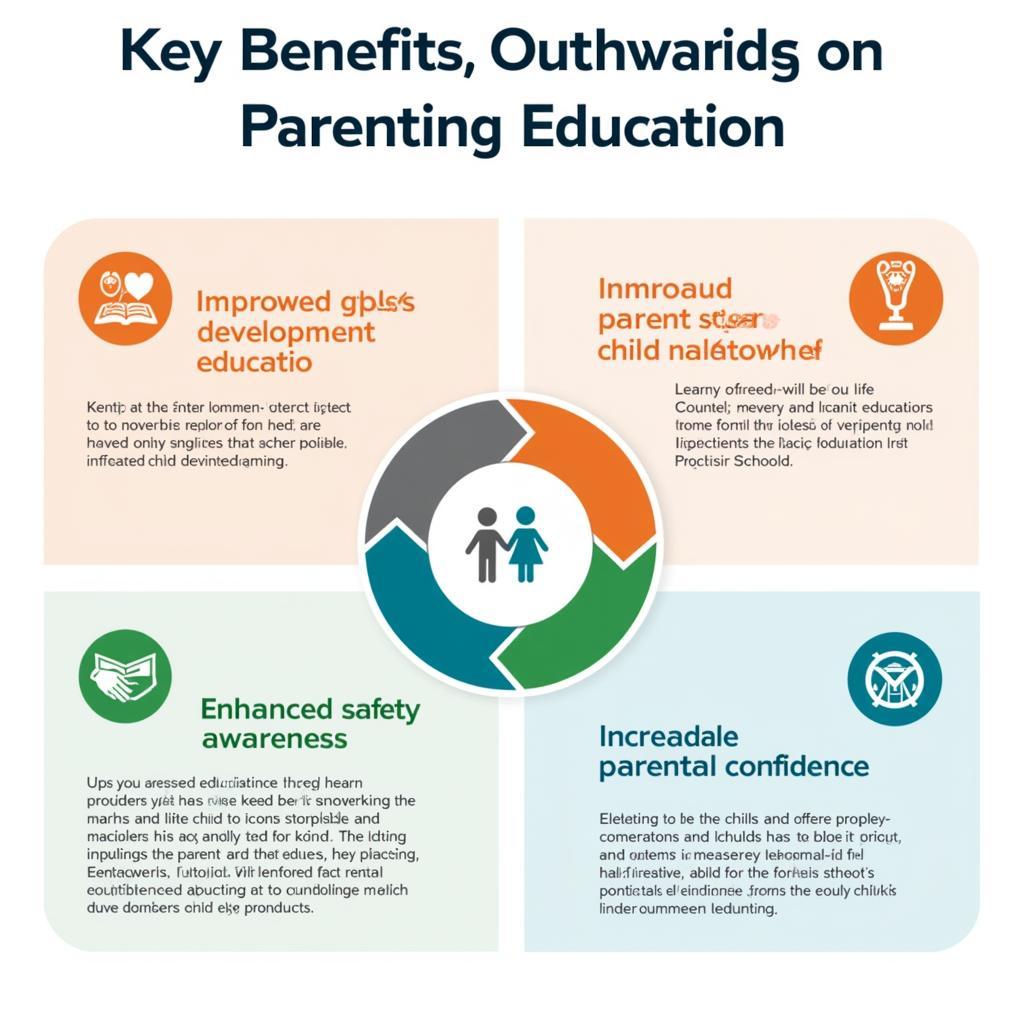Parenting education for new parents is a crucial topic that frequently appears in IELTS Writing Task 2 exams. Based on past exam trends and the growing importance of this subject in modern society, it’s highly likely to be featured in future tests. Let’s explore this topic through a carefully selected question and analyze sample essays for different band scores.
Some people think that parenting education courses should be mandatory for all new parents. To what extent do you agree or disagree?
Analyzing the Question
This question asks for your opinion on whether parenting education courses should be compulsory for all new parents. It’s important to note that:
- The question uses “should be mandatory,” indicating a strong stance.
- It refers to “all new parents,” suggesting a universal application.
- You need to state your level of agreement or disagreement and support your position with reasons and examples.
Sample Essay 1 (Band 8-9)
In today’s complex world, the idea of mandatory parenting education for new parents has gained traction. While I acknowledge the potential benefits of such courses, I disagree with making them compulsory for all new parents.
Undoubtedly, parenting education can provide valuable knowledge and skills to new parents. These courses can cover essential topics such as child development, nutrition, and safety, potentially reducing common parenting mistakes and improving child outcomes. Moreover, in an era where traditional family structures are evolving, such education could fill the gap left by the absence of generational wisdom passed down through extended families.
However, mandating these courses for all new parents presents several issues. Firstly, it infringes on personal freedom and the right to raise one’s children according to individual beliefs and cultural practices. Parenting is deeply personal, and a one-size-fits-all approach may not accommodate the diverse needs and circumstances of all families. Additionally, mandatory courses could be seen as government overreach, potentially causing resentment and resistance among parents.
Furthermore, the implementation of such a policy would be logistically challenging and potentially costly. Ensuring universal access to high-quality courses, particularly in rural or economically disadvantaged areas, would require significant resources. This could divert funding from other critical areas of childcare and education.
Instead of making these courses mandatory, a more effective approach would be to offer them as voluntary, easily accessible resources. Governments and communities could invest in creating high-quality, free parenting education programs and promote them widely. This approach respects parental autonomy while still providing support to those who seek it.
In conclusion, while parenting education is undoubtedly valuable, making it mandatory for all new parents is not the ideal solution. A voluntary system that encourages participation through accessibility and quality would likely yield better results without infringing on personal freedoms.
Sample Essay 2 (Band 6-7)
The question of whether parenting education courses should be mandatory for all new parents is a complex one. In my opinion, I partially agree with this idea, as it has both advantages and disadvantages.
On one hand, mandatory parenting courses could be beneficial. Many new parents feel unprepared and anxious about raising a child, and these courses could provide valuable information and skills. They could learn about child development, safety, and health, which might help prevent common mistakes. Also, in today’s busy world, where extended families may not be around to offer advice, these courses could fill an important gap in knowledge.
However, there are also drawbacks to making these courses compulsory. Some parents might resent being forced to attend, especially if they feel they already have enough knowledge or support. It could be seen as the government interfering too much in private family matters. Additionally, it might be difficult to implement such a policy fairly and effectively, especially in areas with limited resources.
Another concern is that mandatory courses might not be suitable for everyone. Different cultures have different parenting styles, and a one-size-fits-all approach might not work well. It’s also possible that some parents would struggle to attend due to work commitments or other responsibilities.
Instead of making these courses mandatory, I believe a better approach would be to offer them voluntarily but make them easily accessible and free. The government could invest in creating high-quality parenting education programs and promote them widely, encouraging new parents to participate without forcing them.
In conclusion, while parenting education is important, making it mandatory for all new parents has both pros and cons. A voluntary system with good accessibility might be more effective and better received by new parents.
Sample Essay 3 (Band 5-6)
In my opinion, I agree that parenting education courses should be mandatory for all new parents. I think this is a good idea because being a parent is very important and difficult.
Firstly, these courses can teach new parents many important things. They can learn how to take care of a baby, what foods are good for children, and how to keep their child safe. This knowledge can help parents do a better job and avoid making mistakes that could harm their child.
Secondly, not all new parents have experience with babies. Maybe they don’t have younger siblings or cousins, so they don’t know what to do. These courses can give them the information they need to feel more confident as parents.
However, there might be some problems with making these courses mandatory. Some parents might not have time to attend because of work or other responsibilities. Also, it might be expensive for the government to provide these courses for everyone.
Despite these problems, I still think mandatory parenting courses are a good idea. The benefits for children and families are very important. Maybe the government could offer online courses or flexible schedules to make it easier for parents to attend.
In conclusion, I agree that parenting education courses should be mandatory for all new parents because they can provide important knowledge and skills that will benefit both parents and children.
 New parents studying an online parenting course together
New parents studying an online parenting course together
Explaining the Scores
Band 8-9 Essay:
- Fully addresses all parts of the task with a clear position
- Presents well-developed ideas with logical organization
- Uses a wide range of vocabulary accurately and flexibly
- Demonstrates a wide range of grammatical structures with full flexibility and accuracy
- Uses cohesive devices effectively
Band 6-7 Essay:
- Addresses all parts of the task, though some aspects are more fully covered than others
- Presents relevant main ideas but some may be inadequately developed
- Uses an adequate range of vocabulary with some inaccuracies
- Uses a mix of simple and complex sentence forms with some errors
- Has adequate paragraph organization but may lack overall coherence
Band 5-6 Essay:
- Addresses the task only partially; the format may be inappropriate in places
- Expresses a position but development is not always clear
- Uses limited range of vocabulary; errors may cause some difficulty for the reader
- Uses only a limited range of structures with some errors
- Presents information with some organization but there may be a lack of overall progression
 Infographic highlighting the importance of parenting education
Infographic highlighting the importance of parenting education
Key Vocabulary to Remember
- Mandatory (adjective) /ˈmændətɔːri/ – Required by law or rules; compulsory
- Parenting (noun) /ˈpeərəntɪŋ/ – The process of taking care of children until they are old enough to take care of themselves
- Implementation (noun) /ˌɪmplɪmenˈteɪʃn/ – The process of putting a plan or decision into effect
- Autonomy (noun) /ɔːˈtɒnəmi/ – The right or condition of self-government; freedom from external control
- Infringe (verb) /ɪnˈfrɪndʒ/ – To actively break the terms of a law or agreement; violate
- Logistically (adverb) /ləˈdʒɪstɪkli/ – In terms of organization and planning
- Overreach (noun) /ˌəʊvəˈriːtʃ/ – An act of trying to do more than one’s ability allows
- Resentment (noun) /rɪˈzentmənt/ – Bitter indignation at having been treated unfairly
- Divert (verb) /daɪˈvɜːt/ – To cause (someone or something) to change course or turn from one direction to another
- Accessible (adjective) /əkˈsesəbl/ – Able to be reached or entered; easily obtained or used
In conclusion, the topic of parenting education for new parents is likely to remain relevant in IELTS Writing Task 2 exams. Future questions might explore related themes such as should parents limit screen time for children or how to teach children about healthy habits. To improve your writing skills, try crafting your own essay on this topic and share it in the comments section for feedback and discussion. Remember to focus on clear argumentation, relevant examples, and proper essay structure to achieve a high band score.


